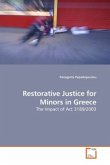Currently, restorative justice is not used in the
resolution of human rights cases. This work explores
how human rights cases can be redressed through the
use of restorative justice and identifies the
commonalities, differences and obstacles in the use
of restorative justice compared to the processes
traditionally used. The study explores the
circumstances in which restorative justice would be
inappropriate, and considers how restorative justice
processes might be used in systemic discrimination
cases. The recommendations outline next steps in
terms of future research required in this area. A
human-rights restorative justice model could serve
to increase the participants satisfaction in the
resolution of human rights cases, and provide a
mechanism for education and law reform. This study
will be of interest to human rights professionals
and activists, as well as to advocates and the legal
profession.
resolution of human rights cases. This work explores
how human rights cases can be redressed through the
use of restorative justice and identifies the
commonalities, differences and obstacles in the use
of restorative justice compared to the processes
traditionally used. The study explores the
circumstances in which restorative justice would be
inappropriate, and considers how restorative justice
processes might be used in systemic discrimination
cases. The recommendations outline next steps in
terms of future research required in this area. A
human-rights restorative justice model could serve
to increase the participants satisfaction in the
resolution of human rights cases, and provide a
mechanism for education and law reform. This study
will be of interest to human rights professionals
and activists, as well as to advocates and the legal
profession.








